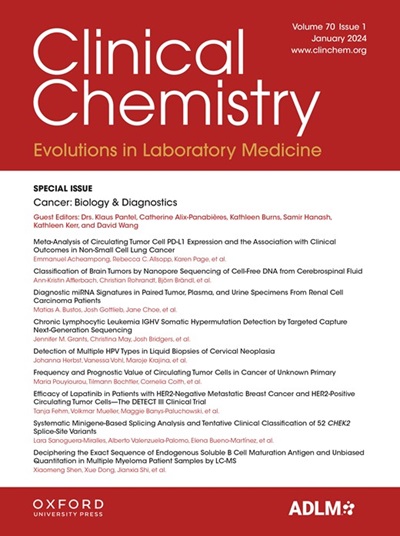A-205 评估临床实验室供应链复原力的成本和重要性
IF 7.1
2区 医学
Q1 MEDICAL LABORATORY TECHNOLOGY
引用次数: 0
摘要
背景 最近发生的大流行病、流行病和疫情持续凸显了弹性供应链在医疗保健领域的极端重要性,特别是在临床实验室,及时获得供应对患者护理至关重要。无论是全球性危机还是局部性挑战造成的供应链中断,都会严重影响实验室的运营,导致诊断延误、患者治疗效果受损和成本增加。据估计,患者 EMR 中 70%-80% 的内容是临床实验室结果。尽管如此,临床实验室供应链的恢复能力仍然是一个未得到充分解决的问题,而且仍然是一个热门词汇。方法 为了评估临床实验室供应链恢复能力的成本和重要性,我们对 9 位医疗保健供应链专家进行了全面审查和访谈,分析供应链中断对实验室运营和患者护理的影响。我们还从不同地区的临床实验室(包括医院、独立实验室和研究机构)收集了数据,并对 50 名实验室专家进行了调查,回复率为 50%。评估的主要指标包括-供应链中断的频率和持续时间。-因供应链中断而产生的财务成本,包括与加急运输、替代采购和库存管理相关的费用。-对实验室工作流程、周转时间和患者护理结果的影响。-为降低供应链风险和提高应变能力而采取的策略。结果 我们的审查结果显示了临床实验室供应链恢复能力的成本和重要性: -供应链中断频繁发生,85% 的实验室在过去一年中至少经历过一次重大中断,100% 的实验室在 2022 年经历过中断。-中断的平均持续时间为 2-3 周,导致检验处理和患者护理出现严重延误。-与中断相关的财务成本平均为每家实验室每年 50,000 美元,包括紧急订单和溢价替代品的费用。-采用的常见策略包括增加库存或安全库存、多供应商采购和绘制供应链图。结论 本研究的结论强调了临床实验室供应链应变能力的重要性。供应链中断不仅会带来不便,还会对患者安全、运营效率和财务可持续性构成重大风险。实验室要完成及时、准确地为患者提供结果的使命,就必须在供应链恢复能力方面进行投资。为了继续增强供应链的应变能力,实验室必须采取积极主动的方法,利用数据驱动的洞察力和协作伙伴关系。这包括使供应商网络多样化,并促进实验室与采购团队之间的密切合作。本文章由计算机程序翻译,如有差异,请以英文原文为准。
A-205 Evaluating the Cost and Importance of Supply Chain Resilience in the Clinical Laboratory
Background Recent pandemics, epidemics and outbreaks continually underscore the critical importance of resilient supply chains in healthcare, particularly in clinical laboratories where timely access to supplies is essential for patient care. Supply chain disruptions, whether due to global crises or localized challenges, can significantly impact laboratory operations, leading to delayed diagnoses, compromised patient outcomes, and increased costs. It is estimated that 70%-80% of a patients’ EMR is clinical laboratory results. Despite this, supply chain resilience in clinical laboratories remains an under-addressed issue and remains a buzzword. Methods To evaluate the cost and importance of supply chain resilience in the clinical laboratory, we conducted a comprehensive review and interviews with 9 Healthcare Supply Chain experts analyzing the impact of supply chain disruptions on laboratory operations and patient care. Data was also collected from a diverse range of clinical laboratories, including hospitals, independent labs, and research institutions, spanning different geographic regions as well as a survey of 50 Laboratory experts with a 50% response rate. Key metrics assessed included: -Frequency and duration of supply chain disruptions. -Financial costs incurred due to disruptions, including expenses related to expedited shipping, alternative sourcing, and inventory management. -Impact on laboratory workflow, turnaround times, and patient care outcomes. -Strategies employed to mitigate supply chain risks and enhance resilience. Results Our review revealed findings regarding the cost and importance of supply chain resilience in the clinical laboratory: -Supply chain disruptions were frequent, with 85% of laboratories experiencing at least one significant disruption in the past year and 100% in experienced disruptions 2022. -The average duration of disruptions was 2-3 weeks, leading to substantial delays in test processing and patient care. -Financial costs associated with disruptions averaged $50,000 per laboratory per annum, including expenses for rush orders, and premium-priced alternatives. -Common strategies employed were increased inventory or safety stocks, multi-vendor sourcing, and supply chain mapping. Conclusions The findings of this study underscore the critical importance of supply chain resilience in the clinical laboratory. Supply chain disruptions are not just inconveniences; they pose significant risks to patient safety, operational efficiency, and financial sustainability. Investing in supply chain resilience is imperative for laboratories to fulfill their mission of delivering timely and accurate patient results. To continue to enhance supply chain resilience, laboratories must adopt a proactive approach, leveraging data-driven insights and collaborative partnerships. This includes diversifying supplier networks and fostering closer collaboration between laboratory and procurement teams.
求助全文
通过发布文献求助,成功后即可免费获取论文全文。
去求助
来源期刊

Clinical chemistry
医学-医学实验技术
CiteScore
11.30
自引率
4.30%
发文量
212
审稿时长
1.7 months
期刊介绍:
Clinical Chemistry is a peer-reviewed scientific journal that is the premier publication for the science and practice of clinical laboratory medicine. It was established in 1955 and is associated with the Association for Diagnostics & Laboratory Medicine (ADLM).
The journal focuses on laboratory diagnosis and management of patients, and has expanded to include other clinical laboratory disciplines such as genomics, hematology, microbiology, and toxicology. It also publishes articles relevant to clinical specialties including cardiology, endocrinology, gastroenterology, genetics, immunology, infectious diseases, maternal-fetal medicine, neurology, nutrition, oncology, and pediatrics.
In addition to original research, editorials, and reviews, Clinical Chemistry features recurring sections such as clinical case studies, perspectives, podcasts, and Q&A articles. It has the highest impact factor among journals of clinical chemistry, laboratory medicine, pathology, analytical chemistry, transfusion medicine, and clinical microbiology.
The journal is indexed in databases such as MEDLINE and Web of Science.
 求助内容:
求助内容: 应助结果提醒方式:
应助结果提醒方式:


